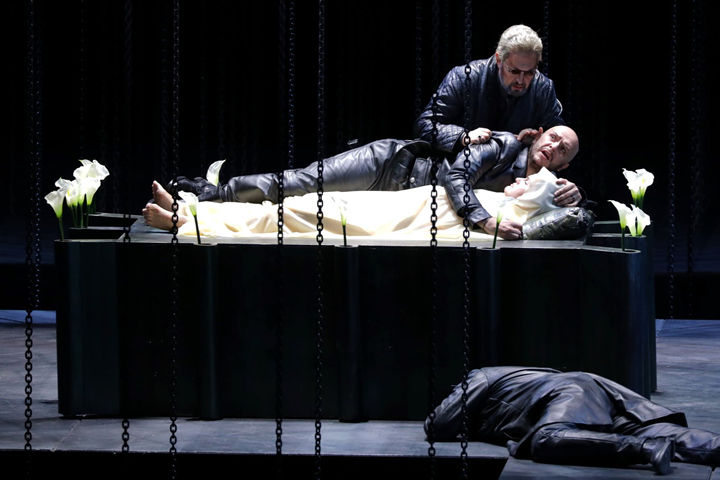| Opera Reviews | 4 May 2024 |
A worthwhile revival of Montemezzi's rarely performed operaby Silvia Luraghi |
|
Montemezzi: L'amore dei tre re |
|
 |
|
|
As the last title of the 2022-23 season, Milan’s Teatro alla Scala presented a rare revival of Italo Montemezzi’s once popular opera L’amore dei tre re. Montemezzi’s work, which had its world premiere on the same stage in 1913, became a regular feature especially in the USA, remaining in the Met’s repertoire until the end of the second world war, championed by Arturo Toscanini, who also directed the American premiere in 1914. At La Scala it enjoyed regular revivals before disappearing from the company’s repertoire after 1953. In recent years, Montemezzi’s score received increasing attention from companies across the world, with revivals at Turin’s Teatro Regio (2005) and by the Opera Orchestra of New York (2006). So this Milan revival after seventy years of absence was a timely opportunity to appreciate a score which deserves more renown. Montemezzi’s music is deeply embedded in contemporary trends better known from central Europe, with a rich orchestration remindful of Zemlinsky or Korngold. The libretto, on the other hand, is not among the strengths of this work. Written by Sem Benelli (better know for the libretto of Umberto Giordano’s La cena delle beffe), who adapted his own drama, it features a dark colored Medieval tragedy, with three protagonists involved in love and revenge. The plot is not especially elaborate with the blind Archibaldo discovering Fiona’s (his daughter in love) betrayal, while she is thorn between her love for Avito and her vow to Manfredo. The production, directed by Àlex Ollé of La fura dels Baus, did not infuse any action into the production, but rather highlighted the substantial static nature of the libretto. On the empty stage, set designer Alfons Flores filled the space with long black chains hanging from above. The three acts showed Fiona and Avito in the woman’s bedroom, with Archibaldo eagerly listening to any noise that could betray the presence of a man, then a staircase leading to Fiona’s balcony and finally Fiona’s catafalque. During the musical introduction to the last act Archibaldo spread the poison on the dead lips. The vocal score relies on frequent declamation and requires sizable, well trained voices that can convey the passionate impetus of the protagonists. Soprano Chiara Isotton was arguably the best on stage, displaying an even, darkly colored voice which covered the range apparently without effort. At her side, bass Evgeny Stavinsky, making his company debut, was a vicious enough Archibaldo, concealing with his concern for his son his own desire for Fiona. Baritone Roman Burdenko sang the role of Manfredo, the most nuanced character who mixes his love feelings for Fiona, with jealousy and in the end compassion for his dying rival. In contrast, tenor Giorgio Berrugi as Avito portrayed a lustful character, with no hesitation in his passion. In the pit, conductor Pinchas Steinberg skillfully highlighted the many merits of the score, followed with commitment by the orchestra.
|
|
| Text ©
Silvia Luraghi Photo Brescia e Amisano © Teatro alla Scala |
|







